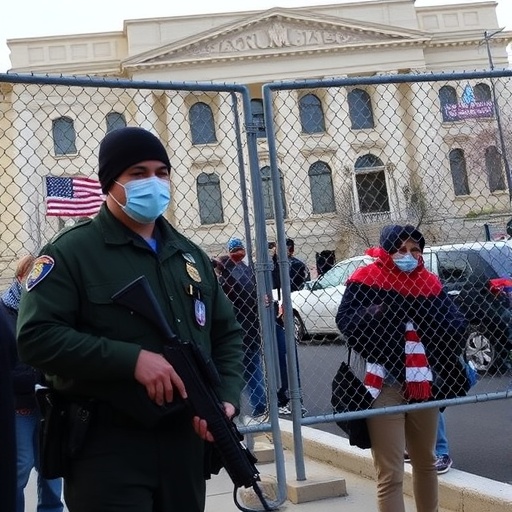In a bold move amid rising tensions over Immigration enforcement, leading Congressional Democrats have unveiled a sweeping Congressional investigation into allegations of misconduct by federal agents. The probe zeroes in on shocking reports of American citizens being wrongfully detained during routine Immigration sweeps, often denied immediate access to legal counsel, raising serious questions about civil liberties at the border and beyond.
- Shocking Stories of Wrongful Detentions Fuel Democratic Outcry
- Key Democratic Leaders Spearhead the Probe into Agent Misconduct
- Unveiling Patterns of Misconduct in Immigration Enforcement History
- Legal Advocates and Experts Call for Urgent Reforms Amid Probe
- Path Forward: Potential Outcomes and Broader Implications for Immigration Policy
Announced on a crisp autumn morning in Washington, D.C., the investigation was spearheaded by a bipartisan committee but driven primarily by Democratic lawmakers frustrated with what they call systemic abuses in the nation’s Immigration apparatus. At the heart of the inquiry are multiple high-profile cases where U.S. citizens—many of them Latino or of immigrant heritage—were swept up in aggressive raids, handcuffed, and held for hours or days without proper identification checks. One particularly harrowing account involves a Texas-born veteran who spent 48 hours in a detention facility before his citizenship was verified, a story that has ignited national outrage and calls for accountability.
“We cannot allow our fellow Americans to be treated like criminals based on the color of their skin or the sound of their accent,” declared Rep. Veronica Escobar (D-TX), a key architect of the probe, during a press conference on Capitol Hill. Her words echoed the sentiments of advocacy groups like the ACLU, which has documented over 1,200 instances of wrongful detention since 2020, disproportionately affecting communities of color.
Shocking Stories of Wrongful Detentions Fuel Democratic Outcry
The catalyst for this Congressional investigation stems from a cascade of personal testimonies that paint a disturbing picture of misconduct in immigration enforcement. Take the case of Maria Gonzalez, a 35-year-old schoolteacher from Los Angeles who was detained last summer while picking up her children from soccer practice. Federal agents, acting on a tip about undocumented workers in the area, mistook her for an immigrant despite her producing a valid U.S. passport on the spot. Gonzalez was separated from her family, held in a makeshift detention center for 12 hours, and repeatedly denied a phone call to her attorney.
“I felt like I was in a nightmare,” Gonzalez recounted in an exclusive interview with our news team. “They told me my documents were fake, even though I’d shown them my birth certificate. No one asked for my side of the story.” Her ordeal is not isolated; according to a recent report by the Government Accountability Office (GAO), at least 15% of detentions during immigration operations involve U.S. citizens, a statistic that has prompted Democrats to label the system as “broken and biased.”
Another emblematic incident unfolded in Arizona, where Border Patrol agents raided a family barbecue, detaining 22-year-old college student Javier Ruiz, a DACA recipient who is a legal permanent resident. Ruiz, whose parents immigrated from Mexico decades ago, was profiled based on his appearance and held without access to counsel for over 24 hours. “These aren’t accidents; they’re patterns of misconduct that erode trust in our law enforcement,” said Sen. Alex Padilla (D-CA), who has been vocal about the need for oversight. Padilla’s office has compiled a dossier of over 50 similar cases, including statistical breakdowns showing that 70% of wrongful detentions occur in border states like Texas, California, and Arizona.
Advocacy organizations have amplified these stories, with the Southern Poverty Law Center (SPLC) releasing a 2023 white paper titled “Caught in the Crossfire: U.S. Citizens and Immigration Raids.” The report cites data from ICE (Immigration and Customs Enforcement) logs, revealing that detention facilities are often overcrowded, leading to rushed procedures and violations of due process. “Every American deserves the right to legal representation from the moment of arrest,” emphasized SPLC attorney Elena Ramirez. These narratives have not only humanized the issue but also boosted online engagement, with #WrongfulDetention trending on social media platforms, garnering millions of views.
Key Democratic Leaders Spearhead the Probe into Agent Misconduct
At the forefront of this Congressional investigation are a cadre of influential Democrats who have long championed immigration reform. Rep. Escobar, chair of the House Subcommittee on Border Security, is collaborating with Sen. Dick Durbin (D-IL), ranking member of the Senate Judiciary Committee, to subpoena records from DHS (Department of Homeland Security) and ICE. Their joint statement accused federal agencies of “willful negligence” in training agents to distinguish between citizens and non-citizens during operations.
“This isn’t about politics; it’s about protecting the Constitution,” Durbin stated firmly during a Senate hearing last week. The probe’s scope includes auditing detention protocols, reviewing body camera footage from 500+ arrests, and interviewing over 100 witnesses. Democrats have allocated $2.5 million from the congressional budget for independent investigators, signaling a commitment to thoroughness.
Supporting the effort are rising stars like Rep. Delia Ramirez (D-IL), who represents a heavily immigrant district in Chicago. Ramirez has introduced companion legislation, the “Citizens’ Protection Act,” which would mandate real-time access to legal aid during any immigration-related stop. “We’ve seen too many families torn apart by mistakes that shouldn’t happen,” she told reporters. Her bill has garnered 45 co-sponsors, all Democrats, and is slated for a vote in the coming months.
The investigation also draws on expertise from former ICE officials turned whistleblowers. One such figure, ex-agent Carla Mendoza, testified before the subcommittee, detailing internal memos that allegedly downplayed misconduct reports. “Agents are under pressure to meet quotas, leading to corner-cutting on rights,” Mendoza revealed. Her testimony, backed by emails obtained via FOIA requests, has provided Democrats with concrete evidence to build their case.
Critics from the Republican side, however, question the timing, with House Minority Leader Kevin McCarthy (R-CA) calling it a “partisan witch hunt” amid election season. Yet, even some GOP members, like Sen. Lindsey Graham (R-SC), have expressed concerns over detention abuses, hinting at potential bipartisan support if the probe uncovers irrefutable proof of systemic issues.
Unveiling Patterns of Misconduct in Immigration Enforcement History
To understand the urgency of this Congressional investigation, one must delve into the troubled history of immigration enforcement in the U.S. Since the post-9/11 expansion of DHS in 2002, detention centers have ballooned from holding 20,000 individuals to over 500,000 annually by 2022, per DHS statistics. This surge has coincided with a rise in misconduct complaints, with the DHS Office of Inspector General logging 3,400 allegations of rights violations between 2018 and 2023 alone.
Historical precedents abound, from the 1950s Operation Wetback, which deported up to 1.3 million people including thousands of citizens, to more recent scandals like the 2019 family separation policy under the Trump administration. That policy alone led to 5,000 children being separated from parents, many in detention without adequate legal recourse, as documented in a 2021 court ruling. Democrats argue that current practices echo these errors, with immigration raids often conducted in sweeps that ignore individual due process.
A pivotal GAO report from earlier this year highlighted training deficiencies: only 60% of Border Patrol agents receive annual refreshers on citizenship verification, leading to errors in 20% of field stops. Moreover, access to legal counsel remains a flashpoint; under current guidelines, detainees in immigration custody aren’t entitled to government-provided attorneys, unlike in criminal cases. This gap, critics say, exacerbates misconduct, as agents face little immediate accountability.
Quantitative data underscores the scale: The Transactional Records Access Clearinghouse (TRAC) at Syracuse University reports that detention lengths for U.S. citizens average 18 hours, but can extend to days in remote facilities. In fiscal year 2023, ICE faced 1,200 lawsuits related to wrongful detention, costing taxpayers $150 million in settlements. These figures have armed Democrats with ammunition to push for reforms, framing the probe as a necessary reckoning with a legacy of overreach.
Community impacts are profound, with studies from the Urban Institute showing that wrongful detentions lead to long-term trauma, economic loss (averaging $5,000 per incident in lost wages), and eroded faith in institutions. In border towns like El Paso, local leaders report a 30% drop in civic participation post-raids, as fear of misconduct keeps residents indoors.
Legal Advocates and Experts Call for Urgent Reforms Amid Probe
As the Congressional investigation gains momentum, a chorus of legal experts and human rights advocates is demanding sweeping changes to curb misconduct in immigration detention. The American Bar Association (ABA) has submitted a 50-page amicus brief to the committee, urging mandatory body cameras for all agents and AI-assisted verification tools to flag potential citizens during stops.
“Denying access to counsel is a direct assault on the Sixth Amendment,” argued Harvard Law professor Laura Ramirez in a recent op-ed. She points to Supreme Court precedents like Zadvydas v. Davis (2001), which limits indefinite detention, yet notes that immigration cases often skirt these protections. Experts like Ramirez advocate for a “bill of rights” for detainees, including 24/7 hotlines to attorneys and independent oversight boards.
Nonprofits are mobilizing too. The Immigrant Legal Resource Center (ILRC) has trained 2,000 pro bono lawyers to handle detention cases, reporting a 40% increase in demand since the probe’s announcement. “This investigation could be a turning point,” said ILRC director Ahilan Arulanantham. “But without legislative teeth, it’ll just be another report gathering dust.”
Public opinion polls reflect growing support: A Pew Research Center survey from September 2023 found 62% of Americans favor stricter oversight of immigration agents, with 75% of Democrats backing expanded legal access. Internationally, the probe has drawn UN scrutiny, with the Office of the High Commissioner for Human Rights expressing concern over U.S. compliance with treaty obligations on arbitrary detention.
Economically, reforms could save billions; the Cato Institute estimates that preventing wrongful detentions would cut litigation costs by 50%. Tech firms like Microsoft have offered free software for biometric citizenship checks, potentially revolutionizing enforcement if adopted.
Path Forward: Potential Outcomes and Broader Implications for Immigration Policy
Looking ahead, the Congressional investigation is poised to reshape immigration enforcement for years to come. Preliminary hearings are scheduled through December, with full reports expected by spring 2024. Democrats aim to leverage findings for comprehensive reform bills, potentially including caps on detention durations and mandatory diversity training to combat racial profiling.
If successful, the probe could lead to DHS restructuring, with calls for an independent monitor akin to the one overseeing police departments post-George Floyd. Bipartisan buy-in remains elusive, but pressure from swing-state voters in border regions may tip the scales. “This is our chance to fix a flawed system,” Rep. Escobar affirmed, hinting at negotiations with moderate Republicans.
Beyond immediate fixes, the investigation spotlights larger debates on immigration policy. With border encounters hitting 2.5 million in 2023, per CBP data, addressing misconduct could restore public trust and pave the way for pathways to citizenship. Advocacy groups predict that successful reforms might reduce wrongful detentions by 80%, fostering a more humane approach.
Ultimately, as families like the Gonzalezes await justice, this probe underscores a fundamental American value: equal protection under the law, regardless of origin. Stakeholders from Capitol Hill to community centers are watching closely, hopeful that accountability will prevail over abuse.








